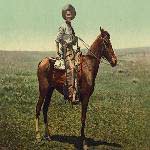
BOB DOUGHTY: Welcome to THE MAKING OF A NATION – American history in VOA Special English.
Last week, we talked about the growth of the cattle industry. This industry started in Texas during the 1870s. With its growth came a new kind of worker -- the man who watched and took care of the cattle. These men who watched the cows and rode with them as they moved across the wild lands were often young. Just boys. And so they were called "cowboys."
This week in our series, Kay Gallant tells what life was like for the early American cowboy.
(MUSIC)
KAY GALLANT: People all over the world have seen all sorts of films about the cowboy. And he is often shown in television shows. But the real life of the cowboy is not often shown. His work has been hard, and his life lonely and full of danger.
The cowboy has told his own story in many songs and ballads. Hundreds of these have come from cowboys whose names are not known. They just sang these songs as they rode on the saddles of their horses across the cattle lands. Or, as they sat at their campfires at night.
They sang about the things that were close to them. Horses and cows and danger and death. Often, they sang about the long ride to the cattle markets where the cows were sold for beef, as in this song called, "Git Along Little Dogie."
Dogie is another name for a young cow, especially one which wanders away from the herd. The song tells how the young cowboy keeps driving the dogies forward. He feels sorry for them, because they will soon be sold for meat. But that's their hard luck, not his. And he keeps pushing them on while he sings.
(MUSIC)
One of the most famous of cowboy ballads is this one, called "The Chisholm Trail."
(MUSIC)
Day and night, the horse was at the cowboy's side. A cowboy was as proud of his horse as he was of his skill in riding him. There is this feeling in the song "I Ride an Old Paint." A paint, or pinto, is a horse of three or more different colors.
(MUSIC)
The cattle herds were driven a very long way to the cattle markets and had to be kept and watched on the open trail for many weeks. And the trail took the cowboys over rough country in all kinds of weather. The wild prairie lands were not friendly to men or animals. It was a lonely land. And the howling of wolves and winds at night made it more so.
Across this strange land, no man in the early days of the West knew just where death was waiting for him. A listener hears the mournful feeling cowboys had for the prairie in this song called, "The Dying Cowboy."
He does not want to be buried out in these wild lands -- in the lone prairie -- as the song says. Still, the dying cowboy does not get his wish. There is no choice. He can be buried only in the lone prairie in a narrow grave six by three. Six feet deep and three feet wide.
(MUSIC)
BOB DOUGHTY:
Our program was written by Harold Braverman. The narrator was Kay Gallant. Transcripts, MP3s and podcasts of our programs are online, along with historical images, at voaspecialenglish.com. Join us again next week for THE MAKING OF A NATION - an American history series in VOA Special English.
American history: gold, land drive settlers West
President Hayes promises only one term in office
Hayes wins hotly disputed 1876 election
Grant’s second term worse than first
American history series: Grant's political battles
American history series: the election of 1868
American history series: rebuilding the South
American history series: Trial of Andrew Johnson
Andrew Johnson faces a fight over aiding South
American history series: the final surrender
American history series: after Lincoln's murder
President Lincoln is shot at Ford's Theater
American history series: Robert E. Lee's surrender
American history series: Confederate capital falls
Lincoln defeats McClellan in 1864 election
Sherman burns Atlanta in March to the Sea
American history series: the battle of cold harbor
Victory at Vicksburg splits the Confederacy
American history series: Lincoln at Gettysburg
South sees protests in North as an opening
American history series: Lee and his army cross into the North
The South wins a battle, but loses Stonewall Jackson
American history series: at Bull Run, a terrible defeat for the North
American history series: South defends its capital
American history series: the Civil War at sea
Lincoln names a general to defend Washington
American history series: the North loses the first major battle of the war
American history series: the Civil War's first days
(來(lái)源:VOA 編輯:陳丹妮)
